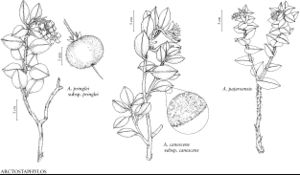Difference between revisions of "Arctostaphylos canescens"
Proc. Calif. Acad. Sci., ser. 3, 1: 84. 1897 ,.
FNA>Volume Importer |
imported>Volume Importer |
||
| Line 7: | Line 7: | ||
}} | }} | ||
|common_names=Hoary manzanita | |common_names=Hoary manzanita | ||
| + | |special_status={{Treatment/ID/Special_status | ||
| + | |code=F | ||
| + | |label=Illustrated | ||
| + | }}{{Treatment/ID/Special_status | ||
| + | |code=E | ||
| + | |label=Endemic | ||
| + | }} | ||
|basionyms= | |basionyms= | ||
|synonyms= | |synonyms= | ||
| Line 19: | Line 26: | ||
-->{{Treatment/Body | -->{{Treatment/Body | ||
| − | |distribution= | + | |distribution=Calif.;Oreg. |
|discussion=<p>Subspecies 2 (2 in the flora).</p><!-- | |discussion=<p>Subspecies 2 (2 in the flora).</p><!-- | ||
--><p><i>Arctostaphylos canescens</i> is widespread in the Coast Ranges of central and northern California and northward into southwestern Oregon.</p> | --><p><i>Arctostaphylos canescens</i> is widespread in the Coast Ranges of central and northern California and northward into southwestern Oregon.</p> | ||
| Line 50: | Line 57: | ||
|basionyms= | |basionyms= | ||
|family=Ericaceae | |family=Ericaceae | ||
| − | |distribution= | + | |distribution=Calif.;Oreg. |
|reference=None | |reference=None | ||
|publication title=Proc. Calif. Acad. Sci., ser. | |publication title=Proc. Calif. Acad. Sci., ser. | ||
|publication year= | |publication year= | ||
| − | |special status= | + | |special status=Illustrated;Endemic |
| − | |source xml=https:// | + | |source xml=https://bibilujan@bitbucket.org/aafc-mbb/fna-data-curation.git/src/bb6b7e3a7de7d3b7888a1ad48c7fd8f5c722d8d6/coarse_grained_fna_xml/V8/V8_816.xml |
|subfamily=Ericaceae subfam. Arbutoideae | |subfamily=Ericaceae subfam. Arbutoideae | ||
|genus=Arctostaphylos | |genus=Arctostaphylos | ||
Revision as of 00:15, 28 May 2020
Shrubs, erect, 0.3–3 m; burl absent; twigs densely short soft-hairy to white-tomentose. Leaves: petiole 3–10 mm; blade whitish gray, dull, orbiculate-ovate, ovate, or elliptic, 2–5 × 1–3 cm, base rounded to cuneate, margins entire, plane, surfaces smooth, gray-canescent, glabrescent. Inflorescences panicles, 1–3-branched, immature inflorescence pendent, (branches crowded, bell-shaped, ± obscured by bracts), axis 1–2 cm, 1+ mm diam., densely short soft-hairy to white-tomentose; bracts not appressed, (spreading), leaflike, wide-lanceolate, 6–20 mm, apex acute, surfaces canescent. Pedicels 5–9 mm, hairy, sometimes glandular. Flowers: corolla white to pink, conic to urceolate; ovary densely white-hairy, sometimes glandular. Fruits depressed-globose, 5–10 mm diam., sparsely hairy or glabrous, sometimes sparsely glandular. Stones distinct.
Distribution

Calif., Oreg.
Discussion
Subspecies 2 (2 in the flora).
Arctostaphylos canescens is widespread in the Coast Ranges of central and northern California and northward into southwestern Oregon.
Selected References
None.
Key
| 1 | Twigs, inflorescence axes, pedicels, and fruits eglandular. | Arctostaphylos canescens subsp. canescens |
| 1 | Twigs, inflorescence axes, pedicels, and fruits glandular-hairy. | Arctostaphylos canescens subsp. sonomensis |
